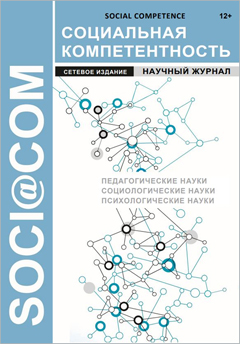The possibilities of focus group discussions in the study of trust practices in the youth environment
DOI:
https://doi.org/10.24866/2658-5855/2023-2/4-19Keywords:
focus group discussion, trust, generalized trust, interpersonal trust, risk societyAbstract
The article explores the possibilities of using the focus group discussion method in the study of trust practices among young people. In the course of applied sociological research, various aspects of understanding trust among young people have been identified. The possibilities of focus group discussion as a method of active and open interaction of the study participants are determined. The analysis of the possibilities of a focus group discussion is carried out. The results demonstrating the differences in the nature of the perception of trust practices among young people are presented. The necessity of a comprehensive study of the phenomenon of trust is determined not only at the verbal, but also at the behavioral level. The necessity of conducting focus group discussions in a natural environment with the involvement of the observation method as an additional component of the analysis of the situation with the manifestation of trust is emphasized.
Downloads
References
Алексеева А.Ю. Основные элементы и структура межличностного доверия // Социологический журнал. 2009. № 3. С. 22–41. Alekseeva A.Yu. (2009) Basic elements and structure of interpersonal trust. Sociological journal. No. 3. P. 22–41. (In Russ.).
Белановский С.А. Глубокое интервью и фокус-группы: учеб.-метод. пособие. М.: ИНФРА-М, 2019. 377 с. Belanovskii S.A. (2019) In-depth interviews and focus groups: stud.-method. manual. Moscow: INFRA-M, 2019. 377 p. (In Russ.)
Гидденс Э. Последствия современности. М.: Праксис, 2011. 343 с. Giddens E. (2011) Consequences of modernity. Moscow, Praxis, 343 p. (In Russ.).
Гирц К. Интерпретация культур. М.: Российская политическая энциклопедия, 2004. 560 с. Geertz K. (2004) Interpretation of cultures. Moscow, Russian Political Encyclopedia, 560 p. (In Russ.). Грановеттер М. Сила слабых связей // Экономическая социология. 2009. Т. 10, № 4. С. 31–50. Granovetter M. (2009) The strength of weak ties. Economic sociology. Vol. 10, No. 4. P. 31–50. (In Russ.).
Крюгер Р., Кейси М. Фокус-группы. Практическое руководство: пер. с англ. М.: Вильямс, 2003. 256 с. Kruger R., Casey M. (2003) Focus groups. Practical guide: translated from English. Moscow, Publishing house Williams, 256 p. (In Russ.).
Левинсон А.Г., Стучевская О.И. Фокус-группы: эволюция метода (обзор дискуссии на конференции ESOMAR) // Мониторинг общественного мнения: экономические и социальные перемены. 2003. № 1. С. 46–55. Levinson A.G., Stuchevskaya O.I. (2003) Focus groups: the evolution of the method (review of the discussion at the ESOMAR conference). Monitoring public opinion: economic and social changes. No. 1. P. 46– 55. (In Russ.).
Осадчая Г.И. Сплоченное общество как идея и вектор инновационного преобразования российского общества // Социальная политика и социология. 2011. № 2. С. 21–31. Osadchaya G.I. (2011) Cohesive society as an idea and vector of innovative transformation of Russian society. Social Policy and Sociology. No. 2. P. 21–31. (In Russ.).
Полухина Е.В. Этнографическая фокус-группа как метод сбора данных в «естественных» группах // Современная социология – современной России: сборник статей памяти первого декана факультета социологии НИУ ВШЭ А.О. Крыштановского, Москва, 01–03 февраля 2012 г. М.: НИУ «Высшая школа экономики», 2012. С. 287–304. Polukhina E.V. (2012) Ethnographic focus group as a method of data collection in "natural" groups. Modern sociology – modern Russia: Collection of articles in memory of the first Dean of the Faculty of Sociology of the Higher School of Economics A.O. Kryshtanovsky, Moscow, February 01–03, 2012. Moscow, Higher School of Economics. P. 287–304. (In Russ.).
Селигмен А. Проблемы доверия. М.: Идея-Пресс, 2002. 200 с. Seligman A. (2002) Problems of trust. Moscow, Idea-Press, 200 p. (In Russ.).
Теннис Ф. Общность и общество // Социологический журнал. 1998. № 3–4. С. 333–357. Tennis F. (1998) Community and society. Sociological Journal. No. 3-4. P. 333–357. (In Russ.).
Фреик Н.В. Концепция доверия в исследованиях П. Штомпки // Социс. 2006. № 11. С. 10–18. Freik N.V. (2006) The concept of trust in P. Shtompka's research. Socis. No. 11. P. 10–18. (In Russ.).
Фукуяма Ф. Доверие: социальные добродетели и путь к процветанию. М.: ACT Москва, 2004. 730 с. Fukuyama F. (2004) Trust: social virtues and the path to prosperity. Moscow: AST Moscow, 730 p. (In Russ.).
Штомпка П. Доверие – основа общества. М.: Логос, 2012. 440 с. Shtompka P. (2012) Trust is the basis of society. Moscow, Logos, 440 p. (In Russ.).
Штомпка П. Социальное изменение как травма // Социс. 2001. № 1. С. 6–16. Shtompka P. (2001) Social change as a trauma. Socis. No. 1. P. 6–16. (In Russ.).
Downloads
Published
Issue
Section
License
Copyright (c) 2023 Scientific journal Social Competence

This work is licensed under a Creative Commons Attribution-NonCommercial-NoDerivatives 4.0 International License.


